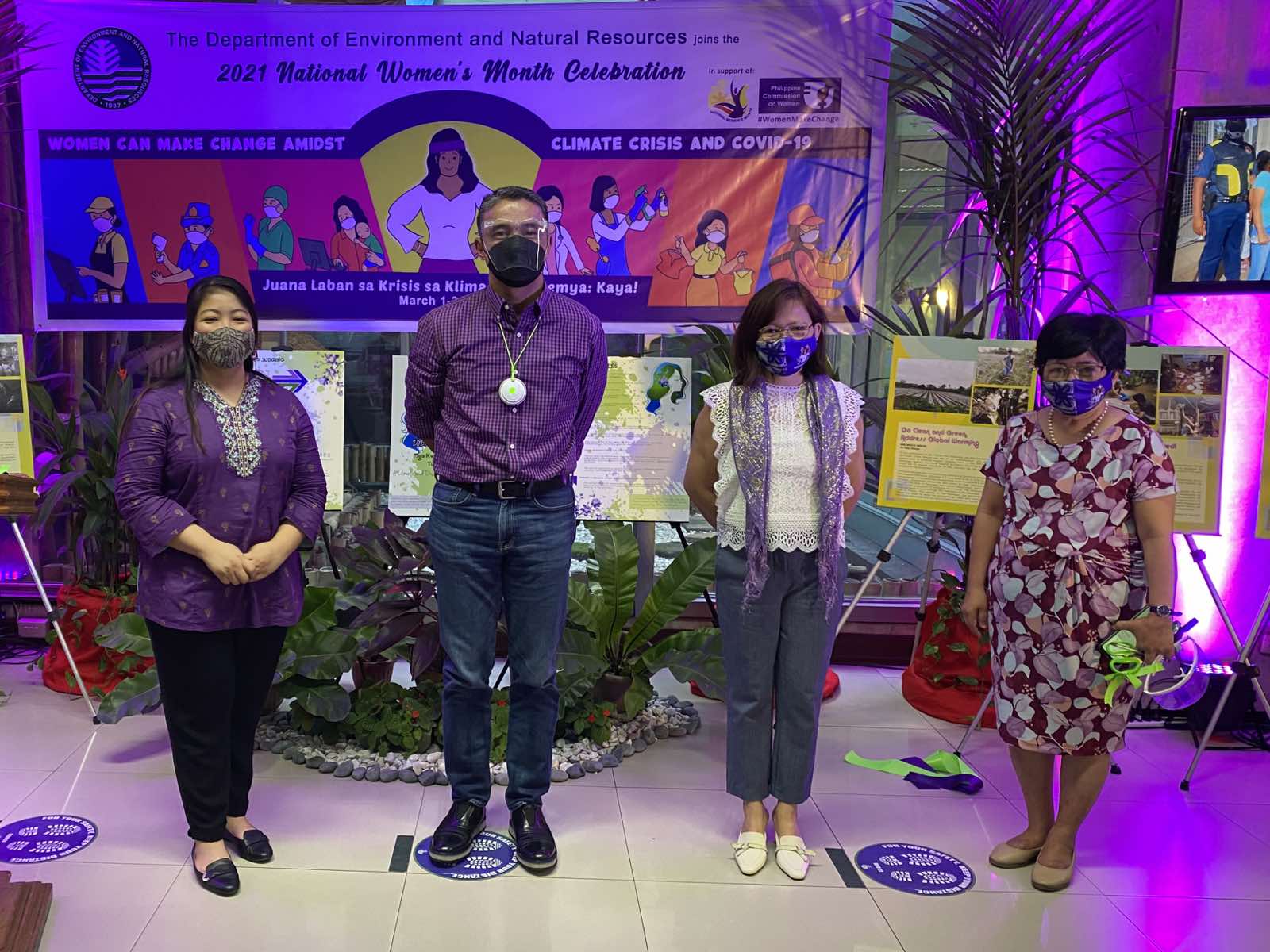
February 28, 2021 Sunday

(From left to right) CCC Commissioner Rachel Anne S. Herrera, DENR Undersecretaries Juan Miguel T. Cuna and Analiza Rebuelta-Teh, and DENR Climate Change Service Director Elenida Basug during the opening of the National Women’s Month celebration held today by the Department of Environment and Natural Resources.
MANILA, 1 March 2021 — The Climate Change Commission (CCC) joins the country in celebration of National Women’s Month this March.
Anchored on the theme, “Women can make change amidst the climate crisis and COVID-19,” the month-long celebration aims to highlight the empowerment of women as active contributors to and claimholders of climate-resilient development. This year’s observance highlights women’s participation in battling the COVID-19 pandemic and climate crisis, as well as discusses gender issues exacerbated by these crises.
“The Climate Change Commission wholeheartedly adopts this year's theme as a good reminder and a timely call to action: "Na laban sa krisis sa klima at pandemya, kaya ni Juana". A more gender-equitable world is a safer and greener world. As the United Nations reminds us with this global celebration, achieving gender equality is an enabler not just for climate action, but all the other SDGs,” said Climate Change Commissioner Rachel Herrera in her message for the opening program of the National Women’s Month celebration of the Department of Environment and Natural Resources Monday.
Women commonly face higher risks and greater burdens from the impacts of climate change and the pandemic in situations of poverty. Moreover, women’s unequal participation in decision-making processes compound inequalities and often prevent women from fully contributing to planning, policy-making and implementation.
In her message, Herrera also highlighted the role of gender equality in driving progress on climate and sustainability, and outlined three key areas of action to achieve this: ensuring the equal participation of women, ensuring enablers for laws and policies promoting gender equality in terms of financial resources and capacity, and strengthening convergence among bodies working on climate and gender.
“I’d like to point out that there is mounting evidence of the link between gender equality and environmental outcomes. May mga studies na po na (there are already studies that show) that when gender inequality is high, we expect higher environmental degradation.”
The program also saw the launch of Mga Kwentong KLIMA-likasan Tungo sa Katatagan: A Recognition Awards on Climate and Disaster Resiliency, led by the DENR Gender Development Office and Climate Change Service. The competition, which will run from March to May 2021, aims to showcase the important contributions and initiatives of men and women working on the environment, climate change, and disaster risk reduction sectors.
“Pagka pinapakita ang climate change, ang tungkol sa kababaihan, parang laging gloomy. So gusto po nating baguhin ‘yung narrative (When we talk about climate change and women, it always seems to be gloomy. We want to change the narrative),” said Atty. Analiza Rebuelta-Teh, Undersecretary for Finance, Information System, and Climate Change, and Chairperson of the DENR National Gender and Development Focal Point System.
“We want to participate in the global good stories movement. In this movement, we share the common belief that we can change the story of the world by changing the storyline,” Teh said.
“We aim to spot and highlight the good stories and in doing so, encourage more to pursue good stories of behavior change in the environment, care for the Earth, and addressing impacts of climate change in their communities,” she added.
“We know there are pockets of good stories and narratives at different levels. As we seek them out, let’s document them, let’s publicize them, and let’s create more ripples of hope,” she emphasized.
The United Nations Framework Convention on Climate Change (UNFCCC) recognizes the critical role of women in response to climate change due to their local knowledge of and leadership in areas like sustainable resource management or leading sustainable practices at the household and community level. Women’s participation at the political level has resulted in greater responsiveness to citizen’s needs, often increasing cooperation across party and ethnic lines and delivering more sustainable peace. At the local level, women’s inclusion at the leadership level has led to improved outcomes of climate-related projects and policies. Likewise, if policies or projects are implemented without women’s meaningful participation, it can increase existing inequalities and decrease effectiveness.
March of every year is declared as National Women’s Month through the following issuances: Proclamation No. 227 s.1998 provides for the observance of the month of March as Women’s Role in History Month; Republic Act 6949 s.1990 declares March 8 of every year as International Women’s Day; and Proclamation No. 224 s.1988 declaring the first week of March each year as Women’s Week and March 8 as Women’s Rights and International Peace Day.
Through this celebration, the CCC calls on the Filipinos to find innovative ways of reimagining and rebuilding systems that work for everyone, regardless of gender and age, in pursuit of sustainable and inclusive development.